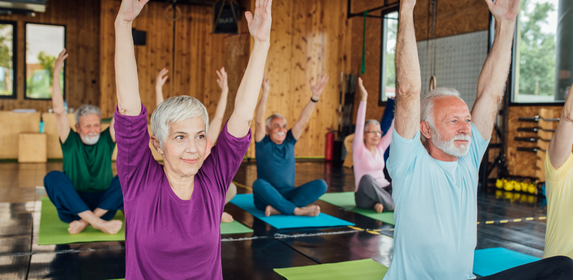During the dormancy of the pandemic a new branch of Yoga was planted, has taken root, and is sprouting out with great promise. It is the Integral Yoga End-of-Life Project. The purpose of the project is to create a new Yoga program that will serve a large populating of aging Baby Boomers and those who love and support them.
It is re-purposing the basic principles and teachings of Integral Yoga, as taught by Sri Swami Satchidandanda – which have taught us how to live a life that is peaceful, easeful, and useful, to the way that we take our leave from this worldly form. The Yogic principals of non-attachment, dis-identification from the body, and living a life of selfless service all support us in our later years. They can teach us to make our exits with grace.
I began teaching Integral Yoga half a century ago, a year after I met Swami Satchidananda in New York City. Last January, I held a series of Zoom meeting with senior Integral Yoga teachers and Integral Yoga Ministers to brainstorm the new curriculum. This resulted in the creation a very long text document filled with notes, links to other websites, and papers on various aspect of hospice care and end-of-life planning.
Since I am a professional web developer (I had built some of the first sites for Swami Satchidananda, the Integral Yoga Teachers Association, Integral Yoga Magazine, and more), I figured that what I could do with the copious notes from those meetings was to build a website on the topic. It may be found at https://yogicendoflife.org.
The website organizes a vast amount of information into six modules: spiritual preparation, physical release, practical planning, community service, memorials and interment, and leaving a legacy.
After the site was launched, Chandra/Jo Sgammato was stepping into semi-retirement after serving as the General Manager and Executive Director of the IYI NY for 18 years. It was she who proposed that Integral Yoga turn the six modules be turned into workshops for the general public. I offered to host the monthly Zoom meetings. Chandra and I identified the senior Integral Yoga teachers and renunciates who could best lead these workshops and we have been co-hosting each event—all as Pro Bono community service. All the Integral Yoga Institutes in the USA (New York, San Francisco, and NJ) and Satchidananda Ashram-Yogaville (Virginia) promoted the workshops and took registration, which was free or by donation. As the workshops occur, they are being posted and will be perpetually available for free on the website —a valuable resource for Yogis and non-Yogis alike.
We are awed and humbled by the project’s positive results, the high attendance, and the desire for more learning that we have seen. It takes a village and, thanks to a village full of effort and support, this valuable program is reaching many people, changing lives, and promising to have a long tail.
By: Karuna Kreps

